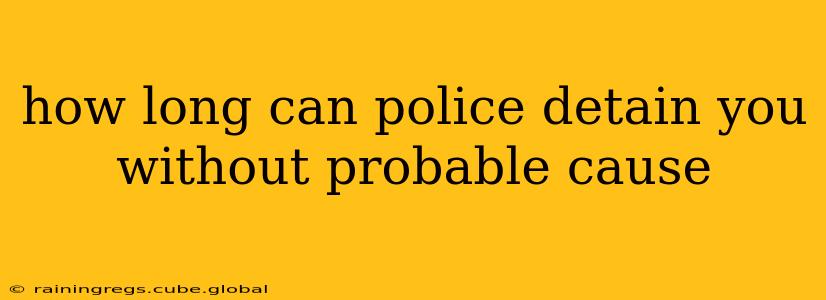The length of time police can detain you without probable cause is a critical aspect of your Fourth Amendment rights, which protect against unreasonable searches and seizures. The answer, unfortunately, isn't a simple number of hours or minutes. It hinges on several factors and varies significantly depending on the circumstances and jurisdiction. Understanding these nuances is crucial for protecting your rights.
What Constitutes a Detention?
Before exploring time limits, it's vital to define what constitutes a police detention. A detention occurs when a reasonable person wouldn't feel free to leave. This isn't just about being physically restrained; it can also include:
- Being stopped and questioned: Even a seemingly brief interaction can be considered a detention if the officer's conduct leads a reasonable person to believe they are not free to leave.
- Being surrounded by officers: Multiple officers converging on an individual can create a sense of confinement.
- Being asked for identification: While generally permissible, this can be part of a broader detention if other factors indicate you're not free to go.
Terry Stops: Brief Detentions Based on Reasonable Suspicion
Police can briefly detain you without probable cause if they have reasonable suspicion that you've been, are, or are about to be involved in criminal activity. This is known as a "Terry stop," named after the landmark Supreme Court case Terry v. Ohio. These stops must be brief and limited in scope. The officer must have a specific and articulable reason for the suspicion, not just a hunch.
The duration of a Terry stop is limited to the time reasonably necessary to investigate the suspicion. Prolonging a Terry stop beyond this point transforms it into an illegal detention.
How Long is "Reasonably Necessary"?
Determining what constitutes "reasonably necessary" is highly fact-specific. It depends on:
- The nature of the suspicion: A suspicion of shoplifting might require a shorter investigation than a suspicion of armed robbery.
- The officer's actions: Did the officer efficiently conduct their investigation? Unreasonable delays can invalidate the stop.
- The availability of information: Could the officer have quickly confirmed or dispelled their suspicion?
What Happens if the Police Exceed the Time Limit of a Terry Stop?
If a Terry stop is prolonged beyond what is reasonably necessary, it becomes an illegal seizure. Any evidence obtained as a result of the illegal detention can be suppressed in court, meaning it can't be used against you.
Detentions at Airports and Border Crossings
Airports and border crossings present unique situations with regard to detention. Enhanced security measures allow for greater leeway in questioning and searches than in other contexts. However, even in these locations, prolonged detentions without reasonable suspicion or probable cause remain problematic.
What if I am detained longer than I think is reasonable?
Document everything you can. Note the time, location, officers' names (if possible), and a description of what happened. Seek legal counsel immediately.
The Role of Probable Cause
Probable cause is a higher standard than reasonable suspicion. It means there are enough facts and circumstances to lead a reasonable person to believe that a crime has been, is being, or is about to be committed. Once probable cause exists, police can make an arrest.
Can I refuse to answer questions?
You generally have the right to remain silent. You are not required to answer questions from police officers unless you are under arrest.
What if I feel I am being illegally detained?
Remain calm and polite. Clearly state that you believe you are being illegally detained and wish to leave. If the officer refuses to let you go, document the encounter and seek legal advice as soon as possible. Remember to never resist arrest.
This information is for educational purposes only and is not a substitute for legal advice. If you have questions about your rights during a police encounter, consult with an attorney. The specifics of detention law are complex and vary by jurisdiction.
